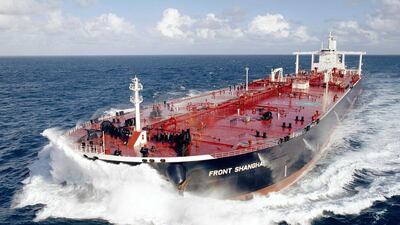Gulf Navigation plans to invest at least US$950 million by 2020 to double its petrochemical fleet and expand operations in the Northern Emirates as the company expects to settle its legacy debts by next year, the chief executive said on Tuesday.
The Dubai-based shipping company will tap global fund providers to finance most of its investments through a “buy-to-lease” mechanism, whereby it will own the ships and then service the investments from the generated income, said Khamis Juma Buamim, declining to name the funds. It will also use other resources to finance its expansion plans.
“Some companies already want us to service their business so they are willing to inject money now to ensure this service is available when they start trading in our region,” said Mr Buamim. “We will use part of our money, but that is only for infrastructure.”
The company has been busy signing a number of agreements to expand its fleet of eight petrochemical tankers and four crew boats and to also enter the oil-products shipping business.
Investments in oil-products vessels will be in addition to the $950m, he said.
“We believe our region, especially Gulf countries, the subcontinent and the Far East will have a lot of growth in certain sectors in the maritime industry,” said Mr Buamim. “Especially in the chemical product side, we don’t believe any major shake-up can happen especially in our region.”
It also announced on Tuesday a recent tie up with Switzerland’s SeaQuest Group to set up a ship management joint venture.
Gulf Navigation’s turnaround comes three years after it suffered a number of high-profile setbacks, including the seizure of two oil tankers by creditors in late 2013, which were later sold, following a default on loans. The company hopes to settle $21m in dues to creditors by the first quarter of next year, as it puts an end to its legacy issues chapter.
The company’s strategy of settling debts and striking partnerships has paid off. Its third-quarter net profit soared to Dh116.8m from Dh5.6m in the year-earlier period. Its Dubai-listed shares have gained 156 per cent year-to-date, versus a 12.4 per cent year-to-date rise in the Dubai Financial Market index.
The company is expanding its operations because of the rise in petrochemical and refining output in the region, Mr Buamim said.
“The main drive at this moment is to stay competitive and create a regional hub, especially in chemical and petrochemical product carriers and it is important that we expand our fleet from this standpoint,” said Mr Buamim.
“The refining capacity in this region is expanding and there is a larger refining product that exists, that requires to be sold regionally and internationally.”
Gulf Navigation plans to acquire petrochemical tankers through partnerships and build new ones through an agreement with China’s Wuchang Group.
The company plans to have four new-built petrochemical ships by 2018, with the option for two more. Mr Buamim said it has secured customers for its expanded petrochemical fleet, without naming them. Its current customers include Saudi Basic Industries Corp, known as Sabic.
Gulf Navigation also entered into an agreement with Dubai-based energy trading company Mena Energy for the leasing, acquisition and commercial management of oil-product tankers. Under the agreement, Gulf Navigation will acquire or build up to 12 oil-product vessels to serve the region.
The company also plans to expand its operations in the Northern Emirates, in the bunkering hub of Fujairah and neighbouring port of Khor Fakkan, where a number of ships anchor on their way to the Arabian Gulf countries. It is expanding its marine shipping services and fleet to help cater to these ships.
“We believe with our international partners we have a lot of work to service them [ships that call on the Northern Emirates] and to do a lot of supply to our joint ventures in the future,” said Mr Buamim. “Most of our ships call on Fujairah before entering the Gulf to go to Jubail or Yanbu in Saudi Arabia.”
dalsaadi@thenational.ae
Follow The National's Business section on Twitter

